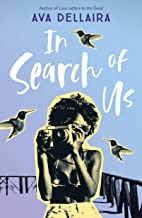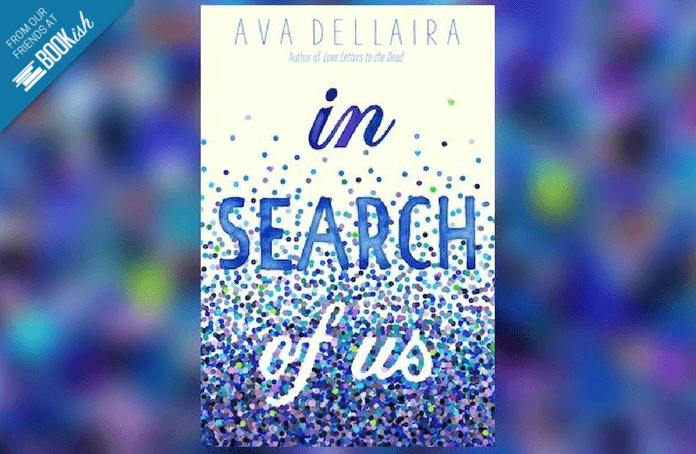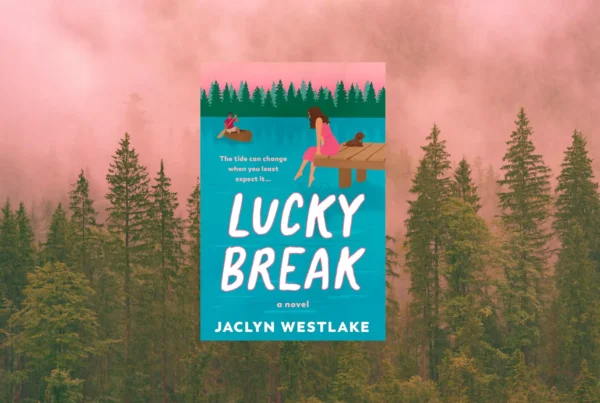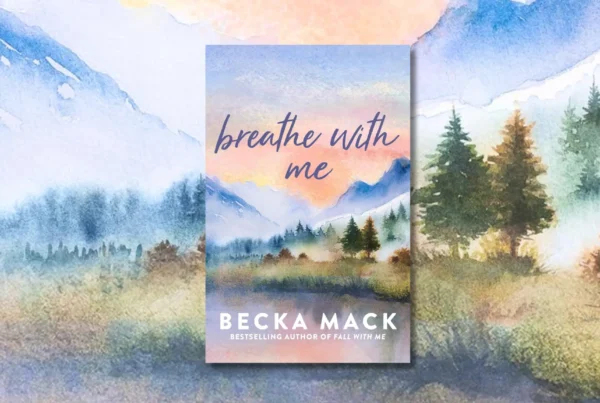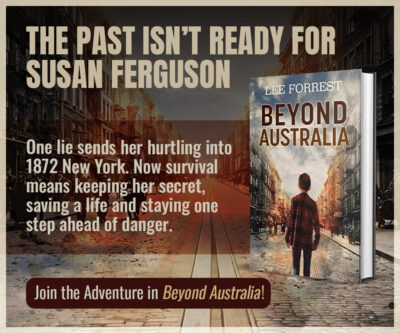In Search of Us by Ava Dellaira
BookTrib is partnering with Bookish to bring you more great content. Ava Dellaira’s sophomore novel, In Search of Us, explores the importance of personal and family history through the lives of two young women. The narrative jumps between the past and the present to weave together the stories of Marilyn, a white teen who struggles to be what her mom wants her to be, and Angie, Marilyn’s biracial 17-year-old daughter who is searching for her father. We had the opportunity to talk with Dellaira about the importance of shared history, her relationship with her mom, and how pregnancy changed how she viewed her own novel.
Bookish: Through Angie and Marilyn, you explore the idea that to know ourselves we must know our history (the history of our own lived experiences, of our family’s experiences, and of our country’s). What first inspired you to write their stories? And what drew you to these themes?
Ava Dellaira: That’s perfectly stated, and is the central theme that emerged while I was writing the book. I believe that in order to create the present and the future that we want for ourselves, we must know where we’re coming from. I often thought of this William Faulkner quote while writing: “The past is never dead. It’s not even past.” We all grow up with this invisible inheritance—from our families, our cultures, our country—and in order to decide what to do with that inheritance, how we might embrace or escape different aspects of it, we must first be able to see it clearly, which is no small task. Whether or not we think about it in those terms, I believe that’s a big part of coming of age. Both Marilyn and Angie are grappling with this in different ways.
My original idea for the book, which was to write about a mom and daughter each on the brink of adulthood at 17, came out of an interest in personal and family history. When I was an older teenager, I began to incorporate my sense of my parents’ history into my emerging sense of self and the story that I told myself about who I was. But after I lost my mom at 22, there was still so much about her feelings and experiences as a young person that I wished I could talk to her about that I would now never be able to ask. And yet, I had a sense that I was influenced by it nonetheless.
As I started to work on the book, to get to know the characters and to explore issues of race, I considered its impact on personal and family history, but it also became a bigger topic, relating to our collective history and to the devastating effects of being unable to face that history. Shortly after I started working on this book, I read “The Case For Reparations,” (an essay by Ta-Nehisi Coates in The Atlantic) and it had a huge impact on me and on my understanding of the very specific ways in which past injustices that have gone unaddressed create present ones. I could go on and on about this essay, but I encourage anyone who hasn’t to read it. It is heartbreaking, but provides a road map for hope, for the possibility of a different future. In Coates’ words, “We must imagine a new country. Reparations—by which I mean the full acceptance of our collective biography and its consequences—is the price we must pay to see ourselves squarely.”
Bookish: You’ve lived in both Los Angeles and New Mexico, like your characters. Were there any experiences of your time in those cities that influenced this book? What made you want to write about your homes in this way?
AD: I think a big part of who we are is influenced by where we come from—literally. So in In Search Of Us, which is about discovering one’s identity, bringing the locations of the characters’ homes to life was important to the story. I tend to use places in my writing that I know intimately so that I can capture their details and texture. I was excited to write about Los Angeles—a city of myth, of dreams and broken dreams, a city that has had so much grafted onto it, including some of my own history. I first moved there just after college and just after my mom’s sudden death. Although I was born in the city, we’d left when I was three and I didn’t have any of my own memories of it. Arriving in LA as young adult, I felt as if there were a city beneath the city: the city of my parents’ invisible past. There was some part of my mother—who had lived there before I was ever alive—that I hoped to discover on the street of her old apartment building, on the beaches where she and my father would spend afternoons fishing, in the restaurants where she once sat, ate, laughed, dreamed. That sensation stayed with me when I began imagining Angie in LA, looking for clues to uncover her past.
Bookish: There’s a sense of longing that permeates this book. Teenagers are often longing for so much (freedom, adventure, a life of their own), but we see the adults in this book share that feeling too. Do you think longing is simply part of the human condition?
AD: I do! I think longing is one of the most poignant (and often painful) human emotions—a kind of desire rooted deep in the soul. It’s true that it’s definitely a feeling I first experienced in all of its intensity during my teenage years. I think adolescence is a time in life when we are becoming well acquainted with our souls in all of their complicated dimensions, when we are often most unfiltered in our feelings, when our deepest desires are closest to the surface. But I don’t think that adults are by any means immune to longing—the feeling will revisit most of us, as we all continue to have dreams and desires throughout our lifetimes. If certain needs have gone unanswered, I think they may manifest as distorted kinds of longing—like in Marilyn’s mom’s case, for stardom and wealth. But underneath, these are usually rooted in a more pure kind of want—for love, for belonging, for recognition.
Bookish: Both of your books (Love Letters to the Dead and In Search of Us) feature characters who turn to music in times of trouble. How does music’s importance in your own life help to inspire its presence in your writing?
AD: Music is one of the first ways that I get inside of a book—when I’m starting on a story and getting to know my characters, I spend a lot of time making playlists, letting myself sink into the feeling of certain songs. It’s almost like a shortcut to getting into the right emotional space for writing, and it can also help to build the texture of a world.
I have found that often, music can touch upon a feeling or set of feelings that would otherwise seem inexpressible—from the time when I first started to listen to Nirvana at the beginning of middle school, music has been able to not only evoke emotion in me, but also to give voice to raw feelings that I may otherwise not have had words for, and this is something that it has does for both Angie and Laurel in each of the books. Another thing I’ve found wonderful about music, and which is important for both of the characters, is that it’s an experience that’s both personal and collective. Listening to a favorite song can feel private and intimate, and yet, you know that so many others are listening to that same song, maybe even at the same time.
Speaking of LA, one of the things that I love about the city is the way that when a new album comes out, you hear it everywhere—through the top of a convertible while waiting at a stoplight, blasting in the parking lot of the grocery store before someone shuts the ignition, from a passing car window while walking down the street. It makes the music feel like this collective experience in a great way. When I started writing In Search Of Us, that album was Kanye West’s The Life Of Pablo, and by the time I was finishing it, it was Damn by Kendrick Lamar, both of which show up in the book.
Bookish: You recently announced on Instagram that you’re expecting a little girl of your own. Congratulations! Has the knowledge that you’re going to be having a daughter given you any new insight into the mother-daughter relationships in this book?
AD: Thank you! I’m so excited. I found out I was pregnant only a couple of months after finishing the book. At the time I was writing it, my now-husband and I were thinking seriously about having a child, and starting to plan for that possibility. There were aspects of the mother-daughter relationship in the book that reflected my own relationship with my mom, and aspects that reflected the ways in which I was imagining my future role as a mother, both consciously and unconsciously.
Being pregnant has already begun to change me in all kinds of ways, and certainly I think it has started to give me insight into the perspective of a mother, but because I’m right in the middle of the experience, it’s hard to reflect on. I am full of love and hope and longing and protectiveness for my unborn daughter, but right now, many of my feelings for her exist on this raw and primal level.
Bookish: The story explores how Angie’s biracial identity impacts her life on a daily basis—from racist encounters with potential employers to the assumption that she isn’t related to her own mother. What was your research and writing process like when trying to describe her experiences?
AD: I chose to write the book in third person in part because I didn’t feel like it was right for me to write in the voice of a biracial character. As much as I feel close to Angie, there are aspects of her experience that are not my own, that I know I cannot fully understand on a personal level. As I was writing, I drew first from the awareness that I’ve gathered from hearing about and empathizing with the experiences of my husband, sister-in-law, and people close to me.
During the writing process I continued listening, watching, and reading as widely as I could as I thought about the role of race in both Angie’s story and in her parents’ stories. For example, Citizen by Claudia Rankine and The Fire This Time, a collection of essays edited by Jesmyn Ward, both had a big impact on me. I also had the opportunity to read an advanced copy of The Beiging of America, a collection of personal essays about biracial identity, which included a lot of interesting perspectives. The remarkable doc series OJ: Made In America, painted a visceral picture of racial tensions in Los Angeles in the 90s, and the devastating practices of the Los Angeles Police Department. In addition to reading his written work, I loved listening to Ta-Nehisi Coates on various podcasts, like the Longform podcast and the New York Public Library podcast. These and other sources helped me to deepen my understanding of racism and racial identity, to further imagine Angie’s experiences, and also to consider my own blind spots and assumptions.
My editor, Joy, and I also did get the perspective of several African American readers prior to publication, including my editor’s assistant (who was involved in the editorial process), a couple of girls I know who were Angie’s age, and my husband, who is also a writer—we’ve been each others’ readers for years and years and of course I trust his perspective.
Bookish: Angie and Marilyn both experience the effects of racism, but in very different ways. They also try to protect each other from its existence by not sharing these experiences. What were the challenges of exploring racism’s effect on two characters who struggle to openly discuss it with each other?
AD: I think it is Marilyn’s job, as the white mom of a biracial girl, to open a dialogue about race with Angie. But despite her love for and commitment to her daughter, Marilyn allows her pain and deep feelings of guilt to get in the way of having an open conversation with Angie about the devastating effects of racism. Because of this, Angie learns to hide her own experiences of racism from her mom, believing that Marilyn is too fragile to handle Angie’s feelings. Over the course of the book, Marilyn comes to understand that she was wrong to think that she could protect Angie by hiding the truth from her, and that by trying to do so, she has hindered Angie’s ability to share and process her experiences as a biracial girl living in America.
One of the themes of the book is the importance of facing our traumas and acknowledging the truth in order to heal, which is what Marilyn and Angie are finally able to do by the end of the story. This is relevant both on a personal level and a collective level, and relevant to the traumas of racism and injustice. I certainly had my own fears and anxieties in writing about issues of race—making missteps, offending or hurting someone, exposing my own blind spots—but ultimately, I think that the risks of talking about the realities of racism are much less dire than the risk of avoiding it, ignoring it, or turning away. I think we all have the responsibility to face it in our own ways, and to open dialogues where we can.
Buy this Book!
Amazon